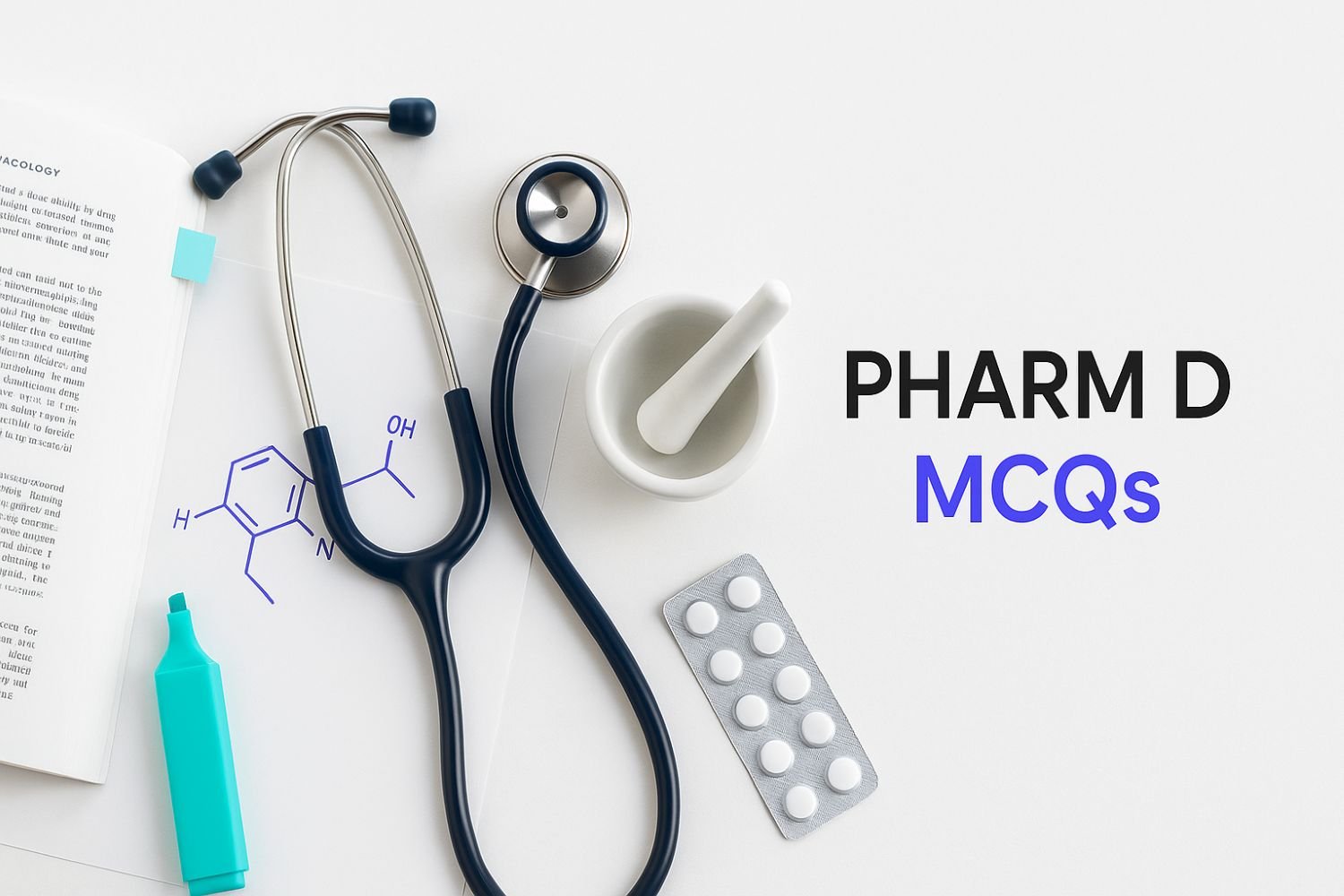
Pharm D MCQs
Subject-wise multiple choice questions for all Pharm D professional years. Tap a subject to start practicing. (All links are internal to PharmacyFreak.)
Year 1
- Pharmacy and Population Health
- Principles of Patient-Centered Care
- Drug Delivery Systems
- Medicinal Chemistry & Pharmacology I
- Pathophysiology & Patient Assessment I
- Personal & Professional Development I
- Medicinal Chemistry & Pharmacology II
- Pathophysiology & Patient Assessment II
- Evidence-Based Practice
- Pharmacy Law & Ethics
- Patient Care I
- Drug Therapy Individualization
- Professional Practice Skills Lab II
2nd Professional Year
- Patient Care II
- Pharmacoeconomics
- Patient Care III
- Personal & Professional Development III
- Professional Practice Skills Lab III
- Sterile Compounding
- Patient Care IV: Gastrointestinal & Renal Disorders
- Patient Care V: Endocrinology & Women’s/Men’s Health
- Personal & Professional Development IV
3rd Professional Year
- Practice Management
- Pharmacoepidemiology & Drug Safety
- Patient Safety & Quality
- Patient Care VI
- Personal & Professional Development V
- Professional Practice Skills Lab V
- Patient Care VII: Brain & Behavior
- Patient Care VIII: Complex Patients
- Personal & Professional Development VI
- Professional Practice Skills Lab VI
Electives
- First Response, Emergency & Disaster Planning
- History of Pharmacy
- Pharmacogenomic Literature Assessment
- Ambulatory Care
- Pediatric & Geriatric Pharmacotherapy
- Pharmaceutical Biotechnology
- Advanced Non-Sterile Compounding
- Managed Care Pharmacy Practice
- Medication Therapy Management
- Anticoagulation Pharmacotherapy
- Oncology Clinical Trials Evaluation
- Women’s Health in Pharmacy Practice
- Integrated Mind/Body Skills
- Foundations of Medication Therapy Management
- Personalized Medicine
- Leading Change in Pharmacy
- Pharmacy Informatics
- Critical Care Pharmacy
- Geriatric Drug Use
- Business Principles in MTM
- Mammalian Molecular Biology
- Forensic Genetics
Why Practice Pharm D MCQs Regularly?
MCQs train speed, recall, and decision-making—the exact skills you need in exams and clinical problem-solving. Practicing every day builds pattern recognition for common distractors, strengthens weak areas, and keeps core concepts fresh across pharmacology, pharmaceutics, medicinal chemistry, pharmacy practice, and patient care. Short, focused sessions compound over time, making revision easier and less stressful.
How to Use These MCQs for Maximum Score
- Study in small sprints: 20–30 minute sets reduce fatigue and keep accuracy high.
- Track your weak topics: Note recurring mistakes (e.g., enzyme inducers, dosage calculations, adverse effects) and revisit them the same day.
- Active recall first, notes later: Attempt without reading notes; then review definitions, pathways, and formulas you missed.
- Repeat tough sets: Redo the same questions after 48–72 hours to lock them into long-term memory.
- Mix subjects smartly: Combine therapeutics with pharmacology and pharmacy law to mimic integrated exam patterns.
What These MCQs Cover
Subject-wise practice covers the Pharm D journey from first principles to clinical application: foundations of medicinal chemistry and pharmacology, pathophysiology and patient assessment, drug delivery systems, evidence-based practice, pharmacoeconomics, sterile and non-sterile compounding, informatics, practice management, therapeutics across organ systems, and specialized electives like critical care, ambulatory care, oncology trials, geriatrics, and women’s health. You’ll find questions ranging from recall to clinical reasoning, including red-flag interactions, dose adjustments, and guideline-aligned choices.
Simple Weekly Plan (Adjust to Your Schedule)
- Day 1–2: Core sciences refresh (pharmacology and medicinal chemistry). Target enzymes, receptors, mechanisms, SAR, ADME.
- Day 3: Pathophysiology and patient assessment (vitals, labs, interpretation, red flags).
- Day 4–5: System-wise therapeutics (GI/renal, endocrine, neuro/psych, infectious diseases), dose calculations, monitoring.
- Day 6: Compounding, law & ethics, practice management, pharmacoeconomics.
- Day 7: Mixed mock sets + error log review. Redo the 10–15 questions you missed most.
High-Yield Habits That Boost Scores
- Read the stem twice: Identify the actual task (mechanism, indication, contraindication, calculation, best next step).
- Eliminate safely: Strike out options with absolute contradictions, non-indications, or wrong units.
- Estimate before calculating: Mental rounding prevents decimal traps in dose and dilution questions.
- Watch for look-alike/sound-alike drugs: Similar names, different classes—don’t rush.
- Review why the right answer is right: One sentence of reasoning after each question cements the concept.
Who This Page Helps
First-year learners building fundamentals, second-year students integrating pharmacology with therapeutics, third-year students polishing clinical decision-making, and interns revising fast before assessments. If you’re preparing for university exams or building confidence for advanced practice, these MCQs keep you on track without guesswork.
Common Topics You’ll Revisit Often
- Drug mechanisms and class effects (agonists/antagonists, enzyme inhibition/induction)
- Adverse effects, contraindications, and monitoring parameters
- Dose calculations, infusion rates, unit conversions, and pharmacokinetics
- Antimicrobial stewardship, resistance patterns, and narrow vs. broad coverage
- Endocrine adjustments (insulin regimens, thyroid dosing, steroid tapering)
- Renal/hepatic dose modifications and therapeutic drug monitoring
- Law, ethics, medication safety, and quality improvement basics
Exam-Day Mindset
Stay calm, trust your training, and manage time with intention. If a question looks unfamiliar, look for clues in the stem—age, comorbidities, lab values, and concurrent drugs usually point to the best option. Mark and move if a calculation is taking too long; return later with a fresh mind. A steady pace and clear elimination strategy are often worth as much as raw knowledge.
Quick FAQ
Do these MCQs match the Pharm D syllabus?
They are organized by subject to align with common university structures and clinical skill outcomes.
How many questions should I do daily?
Start with 40–60 on weekdays and 80–120 on weekends; adjust based on accuracy and schedule.
How do I know I’m improving?
Track your accuracy by subject, list frequent mistakes, and retake the exact questions after 2–3 days.
What if I keep missing the same area?
Pause MCQs for that topic, revise essentials for 30 minutes, then attempt 10 focused questions to reconfirm.
Final Tip
Consistency beats intensity. Even on busy days, finish one short set. Small wins compound, and exam confidence grows naturally when your review is steady and subject-wise.